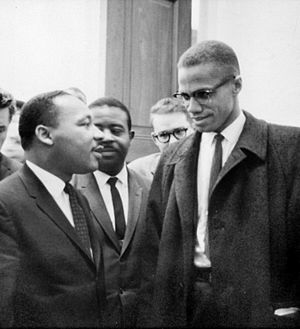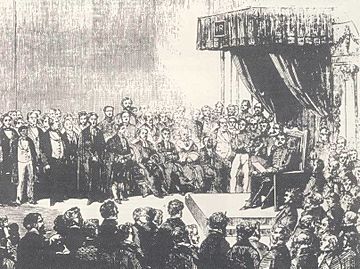Black suffrage facts for kids
Black suffrage is about the right of Black people to vote. For a long time, this was a big issue in countries where Black people were a minority.
Contents
Voting Rights in the United States
Voting rights in the United States have changed a lot over time. Before the American Civil War, some free Black men could vote. But this right was often taken away.
After slavery ended, Black people were supposed to be equal under the law. This included the idea that Black women could vote after 1920. However, Black men were given voting rights in 1870, but Black women were often stopped from voting until the Voting Rights Act of 1965 was passed.
When the U.S. Constitution was first approved in 1789, a few free Black men could vote. They were usually property owners. Most Black men in the United States did not get the right to vote until after the Civil War. In 1870, the 15th Amendment was added to the Constitution. It said that states could not stop a male citizen from voting because of their race or if they used to be enslaved.
However, after this, states in the former Confederate South created "Jim Crow" rules. These rules made it very hard for many Black people to vote.
When people talked about "Black suffrage" right after the Civil War, they usually meant voting rights for Black men only. All women, both Black and white, still had to fight for their right to vote.
The 19th Amendment was approved in 1920. It officially gave women the right to vote. Many Black women tried to vote that fall. But it wasn't until the Voting Rights Act of 1965 was passed, almost 50 years later, that Black women could truly vote freely.
Voting Rights in Australia
The Commonwealth Franchise Act 1902 limited the right of Aboriginal Australians to vote in federal elections. This law was changed in 1962. The Commonwealth Electoral Act was updated to give Aboriginal Australians full voting rights.
Voting Rights in the British Empire and United Kingdom
In the United Kingdom, voting rights slowly expanded over many centuries.
- Starting in 1265, only a small number of wealthy landowners could vote for members of Parliament.
- By 1432, only men who owned land worth a certain amount could vote. Voting was usually for men, not women.
- Ignatius Sancho was the first Black person known to vote in a British election. He voted in Westminster in 1774 and 1780.
- The Reform Act 1832 gave more middle-class men the right to vote.
- Later laws, like the Representation of the People Act 1918, removed property requirements for men to vote.
- The Equal Suffrage Act 1928 finally removed property requirements for women to vote.
People living in British colonies did not have the right to vote for the British government.
- Colonial Jamaica sometimes had limited rights to elect local leaders.
- In Colonial Sierra Leone, the British monarchy chose all leaders until 1953. The 1962 Sierra Leonean general election was the first time everyone in the country could vote.
- The West Indies Federation (1958–1962) was meant to become independent, but it never did. Many of its member states later became independent countries.
- Today, people from other Commonwealth countries who live in the UK can vote. They are seen as citizens.
Voting Rights in South Africa
Cape Colony
The Cape Qualified Franchise limited voting based on how much property someone owned, but not directly by race.
- In 1853, the Queen allowed the Cape Colony to have its own parliament. This parliament created a Constitution that did not mention race.
- The Cape Colony's "Responsible Government" Constitution in 1872 clearly said that racial discrimination was not allowed.
- However, later laws made it harder for non-white people to vote. For example, the Franchise and Ballot Act of 1892 raised the amount of property needed to vote. This stopped many non-white voters from participating.
South Africa
- The Representation of Natives Act, 1936 put Black South Africans on separate voter lists.
- Apartheid was a period in South Africa where white supremacy was enforced by many laws. During this time, Black people's right to vote was greatly limited.
- In the 1950s, a crisis happened when the government tried to take away voting rights from Coloured voters (people of mixed race). By 1968, Coloured people lost their representation in Parliament.
- The Promotion of Bantu Self-government Act, 1959 ended Black representation in Parliament. Instead, it created separate areas called Bantustans. Black people's citizenship was moved to these Bantustans by 1970.
- South Africa's 1983 Constitution created a Tricameral Parliament. This parliament had separate chambers for Coloured and Indian voters.
- The South African Constitution of 1993, also called the Interim Constitution, led to the 1994 general election. This was the first election in South Africa where all adults could vote. The date, April 27, is now a national holiday called "Freedom Day".
- The current Constitution of South Africa, adopted in 1997, protects the right of all citizens to vote.
Namibia
- Germany took control of Namibia in 1884, calling it German South-West Africa. The local people fought back, but their rebellions were put down.
- South Africa gained control of the area during World War I. It then governed South-West Africa using apartheid laws and divided it into ten Bantustans.
- Many people in Namibia saw SWAPO as their true government, not South Africa. The United Nations recognized SWAPO in 1972.
- The Namibian War of Independence lasted 22 years. It ended with the New York Accords in 1988. This led to Namibia's first free election in November 1989.
- The Constitution of Namibia, adopted in 1990, says that all citizens have the right to "direct, universal and equal suffrage."
Voting Rights in France
- Before the French Revolution, only some local elections were held. The first real national voting system appeared in 1791.
- From 1791, France used different male voting systems, sometimes based on wealth, sometimes on universal male suffrage. In mainland France, there was no rule based on race for voting. So, Black men could technically vote and had the same rights as non-Black men. However, their presence was limited in mainland France.
- During the first half of the 19th century, the rules for colonies were often different from mainland France. This was because the government changed often.
- In mainland France:
- In 1794, the government ended slavery.
- In 1802, Napoleon Bonaparte brought slavery back. He also stopped Black people and people of mixed ancestry from entering mainland France.
- In 1815, the slave trade was ended, but slavery itself continued.
- In 1848, slavery was officially ended in France, and all enslaved people were freed.
- In the French Colonial Empire, most local people were not seen as full French citizens. This often meant they did not have the right to vote.
- Vincent Ogé returned to the slave colony of Saint-Domingue and demanded voting rights. He led a rebellion in 1790 and was executed. Enslaved people then took control of the island in the Haitian Revolution and created the Republic of Haiti.
- France had a plan called "assimilation." This meant Black people and local people could gain voting rights if they adopted French culture. These high-status Black people were called les Évoluées.
- People in French colonies often lived under the Code de l'indigénat. This code gave them some voting rights, but these could be changed without their agreement.
- After the Revolution of 1848, France gave limited representation to four cities in Senegal. Ordinary people in these cities gained full voting rights in 1916.
- Lamine Guèye, another politician from Senegal, also helped expand voting rights for people in the colonies.
- People living in African colonies were allowed to vote in the 1958 French constitutional referendum. This vote created the French Community. Most colonies voted for independence, and 17 new Black nations were created in the Year of Africa.
Voting Rights in Belgian Congo
- Black men and women in the Belgian Congo voted for the first time in municipal elections in 1957.
- The first election for the whole country was the 1960 Belgian Congo general election.
See also
- Decolonization of Africa
- Universal suffrage
- Women's suffrage
- Voting rights of Australian Aborigines
 | Aurelia Browder |
 | Nannie Helen Burroughs |
 | Michelle Alexander |



